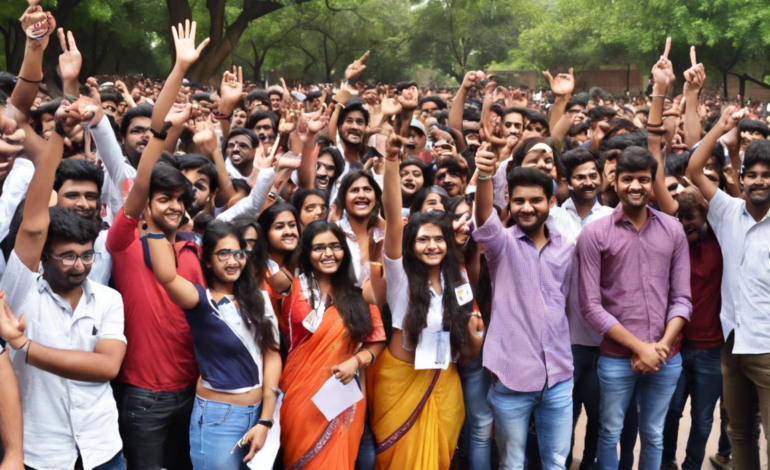
DUSU Election Results Revealed: A Complete Overview
The Delhi University Students’ Union (DUSU) is the representative body for students at the University of Delhi, one of India’s premier educational institutions. Every year, the student community eagerly awaits the DUSU elections, which serve as a reflection of the prevailing political climate in the country. The recently concluded DUSU election results for the academic year have been revealed, sparking discussions and debates among students, faculty, and political observers.
Understanding the DUSU Election Process
The DUSU elections are held annually, typically in September, to elect office bearers for key positions in the students’ union. These positions include the President, Vice President, Secretary, and Joint Secretary. The process involves campaigning by various student organizations affiliated with different political parties, each vying for the support of the student body. Candidates put forward their manifestos outlining their vision and proposed policies if elected.
Key Highlights of the DUSU Election Results
-
Party Affiliations: One of the significant aspects of the DUSU elections is the dominance of major national political parties such as the Akhil Bharatiya Vidyarthi Parishad (ABVP), the student wing of the Bharatiya Janata Party (BJP), and the National Students’ Union of India (NSUI), the student wing of the Indian National Congress. These parties have historically been the frontrunners in the elections.
-
Gender Representation: Another crucial aspect that has garnered attention in recent years is the representation of women candidates in the DUSU elections. There has been a push for increased participation and leadership roles for female students, reflecting the broader societal focus on gender equality.
-
Campaign Strategies: The DUSU elections witness intense campaigning, with candidates utilizing various strategies such as rallies, speeches, posters, and social media outreach to connect with voters. Campaign themes often revolve around issues affecting students, such as educational reforms, campus infrastructure, and student welfare.
Analysis of the DUSU Election Results
The DUSU election results often serve as an indicator of the prevailing political sentiments among the youth in the country. The outcomes are closely watched by political analysts and parties to gauge the popularity of their ideologies among the student community. Key factors that influence the results include:
-
National Political Landscape: The performance of student wings of national political parties in the DUSU elections can reflect the broader political landscape in the country. A strong showing by one party’s student wing may indicate growing support for the parent party’s policies.
-
Local Issues: Students often vote based on issues directly impacting them, such as campus facilities, academic reforms, and student rights. Candidates who address these concerns effectively in their campaigns are likely to garner support from the student body.
-
Alliances and Coalitions: In some instances, student organizations form alliances or coalitions to enhance their chances of winning in the DUSU elections. These alliances may be based on shared ideologies or strategic considerations.
Recent Trends in the DUSU Elections
In recent years, several trends have emerged in the DUSU elections, reflecting evolving dynamics within the student community:
-
Social Media Influence: The use of social media platforms such as Facebook, Twitter, and Instagram has become a prominent feature of DUSU election campaigns. Candidates leverage these channels to reach a wider audience and mobilize support.
-
Youth Activism: Issues such as environmental conservation, social justice, and gender equality have gained traction among students, prompting candidates to incorporate these themes into their campaign agendas.
-
Digital Voting: The introduction of online voting systems has streamlined the election process and increased voter participation. Students can now cast their votes conveniently through online platforms.
Frequently Asked Questions (FAQs) about DUSU Elections
Q1: How are the DUSU election dates determined each year?
A1: The dates for the DUSU elections are typically decided by the University authorities in consultation with student representatives and are based on the academic calendar.
Q2: Can independent candidates contest in the DUSU elections?
A2: Yes, independent candidates are allowed to contest in the DUSU elections, provided they fulfill the eligibility criteria set by the University.
Q3: Are there any restrictions on campaign activities during the DUSU elections?
A3: Campaign activities are regulated, and guidelines are provided to ensure a fair and peaceful election process. Violations of these guidelines can lead to disqualification.
Q4: How are the winners of the DUSU elections determined?
A4: The winners are decided based on the total number of votes received by each candidate for the respective positions of President, Vice President, Secretary, and Joint Secretary.
Q5: What role does the DUSU President play in student governance at Delhi University?
A5: The DUSU President serves as the chief representative of the student body and plays a key role in advocating for student rights, welfare, and interests within the University administration.
Conclusion
The DUSU elections hold significant importance not only for the student community but also as a barometer of youth sentiment and political trends in the country. The intricate interplay of ideologies, campaign strategies, and student issues underscores the complex dynamics at play during these elections. As the results of the recent DUSU elections are analyzed and discussed, they offer insights into the evolving landscape of student politics and aspirations within Delhi University.





